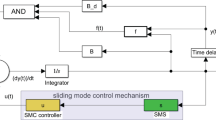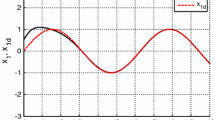Abstract
This paper investigates the robust tracking control of second-order uncertain nonlinear systems by adopting the function augmented sliding mode control approach. An improved version of this approach is proposed such that the exact information of the initial tracking error is not required when generating the desired trajectory of the tracking error. This evidently enlarges the application scope of the function augmented sliding mode control approach. Performance functions are introduced to form the performance envelopes for the sliding mode variables. A robust sliding mode controller is constructed such that the sliding mode variables are confined within their performance envelopes. This further guarantees that the tracking error converges to the given neighbourhood of zero within the preassigned settling time provided that proper control parameters are selected. An application example on the rendezvous control of spacecraft is also employed to illustrate the effectiveness of the proposed control approach.
Similar content being viewed by others
References
S. Li, S. Ding, and Q. Li, “Global set stabilisation of the spacecraft attitude using finite-time control technique,” International Journal of Control, vol. 82, no. 5, pp. 822–836, 2009.
H. Du, S. Li, and C. Qian, “Finite-time attitude tracking control of spacecraft with application to attitude synchronization,” IEEE Transactions on Automatic Control, vol. 56, no. 11, pp. 2711–2717, 2011.
H. Chen, S. Song, and Z. Zhu, “Robust finite-time attitude tracking control of rigid spacecraft under actuator saturation,” International Journal of Control, Automation and Systems, vol. 16, no. 1, pp. 1–15, 2018.
Y. Wu, F. Gao, and Z. Zhang, “Saturated finite-time stabilization of uncertain nonholonomic systems in feedforward-like form and its application,” Nonlinear Dynamics, vol. 84, no. 3, pp. 1609–1622, 2016.
Z. Zhang, G. Duan, and M. Hou, “Global finite time stabilization of pure-feedback systems with input dead-zone nonlinearity,” Journal of the Franklin Institute, vol. 354, no. 10, pp. 4073–4101, 2017.
A. Polyakov, “Nonlinear feedback design for fixed-time stabilization of linear control systems,” IEEE Transactions on Automatic Control, vol. 57, no. 8, pp. 2106–2110, 2012.
A. Polyakov, D. Efimov, and W. Perruquetti, “Finite-time and fixed-time stabilization: Implicit Lyapunov function approach,” Automatica, vol. 51, pp 332–340, 2015.
B. Tian, Z. Zuo, X. Yan, and H. Hong, “A fixed-time output feedback control scheme for double integrator systems,” Automatica, vol. 80, pp 17–24, 2017.
B. Tian, L. Liu, H. Lu, Z. Zuo, Q. Zong, and Y. Zhang, “Multivariable finite time attitude control for quadrotor UAV: theory and experimentation,” IEEE Transactions on Industrial Electronics, vol. 65, no. 3, pp. 2567–2577, 2018.
W. Sui, G. Duan, M. Hou, and M. Zhang, “Distributed Fixed-time Attitude Synchronization Control for Multiple Rigid Spacecraft,” International Journal of Control, Automation and Systems, vol. 17, no. 5, pp. 1117–1130, 2019.
K. Park and T. Tsuji, “Terminal sliding mode control of second-order nonlinear uncertain systems,” International Journal of Robust and Nonlinear Control, vol. 9, no. 11, pp. 769–780, 1999.
J. Liu and F. Sun, “A novel dynamic terminal sliding mode control of uncertain nonlinear systems,” Journal of Control Theory and Applications, vol. 5, no. 2, pp. 189–193, 2007.
K. Zhuang, H. Su, K. Zhang, and J. Chu, “Adaptive terminal sliding mode control for high-order nonlinear dynamic systems,” Journal of Zhejiang University-SCIENCEA, vol. 4, no. 1, pp. 58–63, 2003.
J. Liu and F. Sun, “Chattering free adaptive fuzzy terminal sliding mode control for second order nonlinear system,” Journal of Control Theory and Applications, vol. 4, no. 4, pp. 385–391, 2006.
S. Ri, J. Huang, Y. Wang, M. Kim, and S. An, “Terminal sliding mode control of mobile wheeled inverted pendulum system with nonlinear disturbance observer,” Mathematical Problems in Engineering, 284216, 2014.
S. Mohammed, W. Huo, J. Huang, H. Rifai, and Y. Amirat, “Nonlinear disturbance observer based sliding mode control of a human-driven knee joint orthosis,” Robotics and Autonomous Systems, vol. 75, pp 41–49, 2016.
M. Hou, F. Tan, F. Han, and G. Duan, “Adaptive sliding mode control of uncertain nonlinear systems with pre-assigned settling time and its applications,” International Journal of Robust and Nonlinear Control, vol. 29, no. 18, pp. 6438–6462, 2019.
C. Chen, C. Chang, and H. Yau, “Terminal sliding mode control for aeroelastic systems,” Nonlinear Dynamics, vol. 70, no. 3, pp. 2015–2026, 2012.
J. Huang, F. Ding, T. Fukuda, and T. Matsuno, “Modeling and velocity control for a novel narrow vehicle based on mobile wheeled inverted pendulum,” IEEE Transactions on Control Systems Technology, vol. 21, no. 5, pp. 1607–1617, 2013.
J. Gao and Y. Cai, “Three-dimensional impact angle constrained guidance laws with fixed-time convergence,” Asian Journal of Control, vol. 19, no. 6, pp. 2240–2254, 2017.
F. Zhang and G. Duan, “Integrated translational and rotational finite-time maneuver of a rigid spacecraft with actuator misalignment,” IET control theory & applications, vol. 6, no. 9, pp. 1192–1204, 2012.
F. Zhang and G. Duan, “Robust adaptive integrated translation and rotation finite-time control of a rigid spacecraft with actuator misalignment and unknown mass property,” International Journal of Systems Science, vol. 45, no. 5, pp. 1007–1034, 2014.
L. Sun and W. Huo, “Nonlinear robust adaptive trajectory tracking control for spacecraft proximity operations,” Proceedings of the Institution of Mechanical Engineers, Part G: Journal of Aerospace Engineering, vol. 229, no. 13, pp. 2429–2440, 2015.
X. Tran and H. Kang, “Adaptive hybrid high-order terminal sliding mode control of MIMO uncertain nonlinear systems and its application to robot manipulators,” International Journal of Precision Engineering and Manufacturing, vol. 16, no. 2, pp. 255–266, 2015.
X. Tran and H. Kang, “Arbitrary finite-time tracking control for magnetic levitation systems,” International Journal of Advanced Robotic Systems, vol. 11, no. 10, pp. 157, 2014.
H. Yin, Y. Li, and J. Li, “Decomposed dynamic control for a flexible robotic arm in consideration of nonlinearity and the effect of gravity,” Advances in Mechanical Engineering, vol. 9, no. 2, pp. 1–15, 2017.
F. Zhang, J. Zhang, Y. Zhang, and Z. Lv, “Robust finite time control of heliostationary flight over asteroids,” Advances in Space Research, vol. 62, pp 2046–2054, 2018.
P. Singla, K. Subbarao, and J. Junkins, “Adaptive output feedback control for spacecraft rendezvous and docking under measurement uncertainty,” Journal of Guidance, Control, and Dynamics, vol. 29, no. 4, pp. 892–902, 2006.
Author information
Authors and Affiliations
Corresponding author
Additional information
Publisher’s Note Springer Nature remains neutral with regard to jurisdictional claims in published maps and institutional affiliations.
Recommended by Associate Editor Young Ik Son under the direction of Editor Jessie (Ju H.) Park. This work was supported by the National Natural Science Foundation of China under Grant Number 61773387, the Open Fund of National Defense Key Discipline Laboratory of Micro-Spacecraft Technology (Grant Number HIT.KLOF.MST.201702), and the Major Program of National Natural Science Foundation of China under Grant Numbers 61690210, 61690211, 61690212 and 61690214.
Guangbin Cai received his Ph.D. degree in control science and engineering in 2012 from Rocket Force University of Engineering, and got the reward-gainer of the excellent doctor degree dissertation in Shanxi Province, China. He is now an Associate Professor at College of Missile Engineering, Rocket Force University of Engineering. His main research interests include aircraft guidance and control theory and its applications.
Xinyu Li received his B.Sc. degree in information management and information system from Heilongjiang University, Harbin, China, in 2018. He is currently working toward his M.S. degree in control science and engineering at the Center for Control Theory and Guidance Technology of Harbin Institute of Technology, Harbin, China. His research interests include integrated guidance and control and terminal guidance.
Mingzhe Hou received his B.Eng. and Ph.D. degrees in control science and engineering from Harbin Institute of Technology, in 2005 and 2011, respectively. He became a Lecturer in 2012 and an Associate Professor in 2017 at Harbin Institute of Technology, China. He is a reviewer for American Mathematical Review and outstanding reviewer for several journals. His research interests include nonlinear control, aircraft/spacecraft control. In these fields, he has published over 40 journal papers and a monograph.
Guangren Duan received his B.Sc. degree in applied mathematics, and both his M.Sc. and Ph.D. degrees in control systems theory. From 1989 to 1991, he was a postdoctoral researcher at Harbin Institute of Technology, where he became a professor of control systems theory in 1991. Prof. Duan visited the University of Hull, UK, and the University of Sheffield, UK from December 1996 to October 1998, and worked at the Queen’s University of Belfast, UK from October 1998 to October 2002. Since August 2000, he has been elected Specially Employed Professor at Harbin Institute of Technology sponsored by the Cheung Kong Scholars Program of the Chinese government. He is currently the Director of the Center for Control Systems and Guidance Technology at Harbin Institute of Technology. His main research interests include robust control, eigenstructure assignment, descriptor systems, missile autopilot control and magnetic bearing control. Prof. Duan is an academician of the Chinese Academy of Science and a Fellow of IEEE and IET.
Fei Han received his B.Eng. and Ph.D. degrees in control science and engineering from Harbin Institute of Technology in 2008 and 2018, respectively. His is now a senior engineer of Shanghai Institute of Spaceflight Control Technology. His research interests include guidance, navigation, and control of spaceflight.
Rights and permissions
About this article
Cite this article
Cai, G., Li, X., Hou, M. et al. Improved Function Augmented Sliding Mode Control of Uncertain Nonlinear Systems with Preassigned Settling Time. Int. J. Control Autom. Syst. 19, 712–721 (2021). https://doi.org/10.1007/s12555-019-0873-z
Received:
Revised:
Accepted:
Published:
Issue Date:
DOI: https://doi.org/10.1007/s12555-019-0873-z




